
Another day at the office?
Not quite: on 11 April 2017 we had a special morning planned at Vos Logistics. 8 children of elementary school ‘Noorderlicht’ in Den Bosch (NL) participating in a project from JINC came to visit our location in De Geer to have a look what logistics and transport is all about.
The day was kicked-off with some facts and figures about Vos Logistics, but really the focus was put on the wide variety of different types of jobs at our company. Ivonne van Dijk, HR officer at Vos Logistics: “We set up a very diverse agenda with activities for the day, trying to combine theory and practice. This way, we were able to show them different aspects of our company.”
Despite the fact that the current job choices of our little guests included becoming a professional soccer player or a DJ, we were also able to get them excited about the world of logistics. In the course of the morning we showed them around in our warehouse, explained how things worked and actually had them helping us sort boxes, unloading a trailer and moving pallets around. Everyone had loads of fun!
At the end of the day we let them off with food for thought in their minds and a goodie bag in their hands. Felix (10), student at elementary school ‘Noorderlicht’ summed it up: “Especially the size of the warehouse with all the different products and the large amount of trucks were exciting to me!”
As Vos Logistics, we are happy to say that another event with JINC turned out to be a great success. Tessa de Graaf of JINC: “The activities for the internship developed by Vos Logistics is a great way of supporting the occupational orientation of the children in the logistics industry. By putting theory into practice, the students are gaining a very valuable experience.” Vos Logistics is glad to be supporting tomorrow’s workforce in their career choices.
What is JINC?
JINC gives young people from 8 to 16 years of age the opportunity to experience what the labour market has to offer and what skills one needs for specific jobs. The goal is to enable them to make the right choice in terms of study, to reduce the likelihood of students dropping out and to offer them better prospects for work.
 Contact
Contact